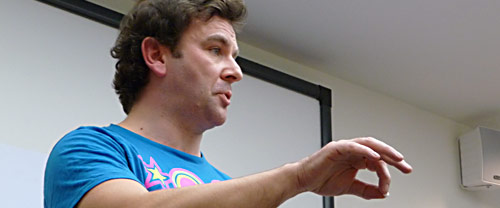
I felt a very different atmosphere at the second annual UK Government Barcamp (aka UKGC09), held at the Ministry of Justice’s offices in central London yesterday. Last year’s event buzzed with potential; all the talk was of things that we could or should do. This time, certainly the sessions I attended anyway, the talk was mainly of things that were starting to happen – or even better, things that had happened.
It’s impossible to write up any kind of authoritative account of the day: like last year, I came away wishing I’d been able to sit in on more sessions than I actually had. Some suggested there was an argument for a longer event, or maybe several shorter events – but I quite like the intensity of the single day approach, and surely it’s good to leave people hungry for more?

I started at the Directgov session led by Paul Clarke and Brian Hoadley, formally (?) launching the Directgov | Innovate programme – which they describe on their new WordPress-powered 🙂 website as: ‘to inform the greater developer community about available resources, to provide a platform to connect with one another, and to showcase new ideas with the aim of supporting and encouraging innovation.’ I’ve pressed for a Directgov blog for a long time, so it’s genuinely great to see this happening. Anything which opens the doors to ‘the community’ out there is a good thing.
Paul was frank that he couldn’t specify what would come out of the programme, but he expected that its first year would see: availability of data sets, a few experimental applications, and some hosting. The room seemed most excited by the prospect of data access – which kinda confuses me. If it’s just data they want, there’s masses of it out there – admittedly, in spreadsheets and CSV files rather than a web-friendly API. Look at the National Statistics site for starters.
Personally, I’m most excited by the prospect of a ‘sandbox’ hosting service – again, something I’ve been pushing for ages. For all the cool stuff we could do, and all the cool things people actually want to do, we need somewhere safe to put it. If nobody’s prepared to offer that, it’s no surprise to see departments buying cheap web hosting accounts left, right and centre. I’ve long argued for someone to step up to provide a service, ideally free of charge, with the kinds of guarantees government needs. It looks like this might actually be it.

Next was Jenny and Lloyd on their work with the Ministry of Justice press office. I’ve always had press offices in my sights: they should be ideally placed to see real benefits from all this online stuff.
Jenny’s been developing a ‘press office dashboard’ concept – and if they’re really saying ‘how did we ever cope without it’, you know we’re getting somewhere. It’s nothing too clever, to be honest: a customised iGoogle homepage, a bunch of Google News search feeds, a ‘starred items’ list, and a daily Feedburner ‘digest’ email. But it’s giving them things they’ve never had before – most notably, Jenny said, breadth of awareness; and there have been a few specific wins, particularly in the regional media. The next step was to go beyond the conventional media, and open their eyes to the blogosphere; but that sounded like it might be much harder work.
(It’s not the only such initiative: Steph has used Netvibes at DIUS (see his paper on the subject), and Shane from Gallomanor gave me a quick demo of a neat little application they’re developing, which does something similar. But it was great to get first-hand feedback of the apparent success of the project.)
Lloyd showed the ‘online media centre’ he had built for them: again, just a stitching together of real world tools – WordPress.com, YouTube, Delicious, all the obvious candidates – but this time, for the press office to create more web-friendly release material for use by journalists. It’s password protected, yet they weren’t prepared to open up comments – which, I think, is both disappointing and entirely to be expected. Maybe they need to be consumers for a bit longer, using Jenny’s work, before they start really producing.

The afternoon just seemed to whizz by. I helped out at the session on corporate blog platforms, led by Julia from DFID and Shane from FCO. I finally caught up with Paul Canning, who talked a bit about user testing. And there was a feisty session to close, on the subject of open source in government, which felt like preaching to the converted (sorry).
All of which meant I missed the session on Twitter; and almost everything on consultation, which was among my key interests for the day. Then there’s the long list of people I meant to speak to, but didn’t get the chance. And the videos I meant to capture, but didn’t get the chance. So yeah, as I say, hungry for more. Will there be another one next year? Put it this way, people were already starting to talk about it.
Responses
You too :]
The DirectGov session I missed. Their widgets development most interests me, though from a marketing angle rather than the one I suspect most participants would take.
[…] Simon and Andrew (watching from afar), Saturday’s Barcamp left me feeling optimistic about the […]
[…] session on using OSS. Simon has my thoughts […]
You have summed up my thoughts exactly – I came away not so much with jaw dropping “I must try this” new ideas, but with lots of “oh, so thats how it has worked/not worked for people” – and a sense of how much has happened in just one year. Good to see so much linking up with local authorities too.
[…] Dickson reports on some of the sessions at last Saturday’s unconference for people involved in – or just […]
Good wasn’t it? Things are definitely going in the right direction.